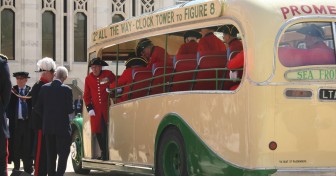MICHAEL BUERK ON THE CASE FOR ‘UNIVERSAL’ BENEFITS
…’partly selfish, partly economic, but especially moral: it’s about justice, social solidarity, and incentivising virtue’
Image courtesy of IanVisits via flickr.com ©©
There is no compensation for growing old, save the thought that the alternative is even less attractive. Grandchildren are delightful, of course; it doesn’t take as long as it did for my hair to dry – but that’s about it.
Except – except for a couple of perks from the State, to set against the ravages of time. My bus pass is a tiny, flickering light in the darkness of my decline. The Winter Fuel Allowance a spasm of official altruism so unusual it shocks and thrills me every year.
They now want to take these things away from me. The politicians, the newspapers, the think tanks, even St Joan of Bakewell, patron saint of the doddery, are all campaigning to have these universal benefits stopped. Reasonably well off people like me don’t deserve them, they say; these benefits should be targeted at the needy.
They’re all wrong.
I grant you it’s –at least partly -a selfish argument. I grant you there is something mildly odd about giving Lord Sugar £200 towards his gas bill, or a bus pass (though I don’t see him swapping his Phantom II for the number 98 any time soon).
But there is a strong case for these universal benefits, an economic but, above all, a moral one.
Means-testing is complex, bureaucratic, expensive and often unfair. It can stigmatise those who qualify, stopping some who could really do with a handout from applying. More fool them, in my view, but Guardian readers and others, soft in heart and brain, worry about these things.
The moral case is about justice, about social solidarity and about incentivising virtue.In economic terms, national insurance is a fiction, but, ideologically, the Welfare State is still predicated on the idea that we pay throughout our lives to insure us against misfortune and to supplement our savings in old age. There is no meaningful difference between the “winter fuel allowance” (which doesn’t have to be spent on fuel, of course) and the state pension; in reality it is a tiny supplement to a pension that has been steadily eroded, in real terms, over the years.
Are they suggesting only the poor should get a state pension? That would be the logical next step. The truth is that, for the Welfare State to work, we all have to have a sense of collective ownership, that is for us, not just for them.
The really telling argument is that means-testing these benefits would be yet another step in penalizing virtue and rewarding, if not vice, at least improvidence. What is the point, as it is, in working hard to put money away when no bank or building society will match inflation, even before tax, and your savings shrink in front of your eyes?
If the reward for prudence and thrift is to lose these – let’s face it - modest concessions as well…..
I was going to sell my car this week but maybe the sensible thing is to ring up Alan Sugar and see how much he wants for his……..



Latest comments
Leave a comment
Sadly, the Agitator is wrong when he says it would be expensive and excessively bureaucratic for these benefits to be ‘means tested’. All that is needed is an existing ‘qualifying benefit’ which is already means tested. This exists in the form of Pension Credit. Although it would be expensive to withdraw all bus passes and re-issue them to those pensioners with Pension Credit, the restriction or the Winter Fuel Payment to Pension Credit recipients could be just a small change to a computer program away.
Personally, I would quite happily forgo the Winter Fuel Payment. It is not a great amount, so I would not miss it. It will probably be left to wither on the vine like the 25p Age Allowance and the £10 Christmas bonus, so why not remove it now from the comfortably off among us and keep it well up with inflation for those who need it.
However, the bus pass has become part of my life now, and I would miss it. There are good ecological reason for it. For the last five years of my working life, I used the bus to travel into work. It meant one less car polluting the air and clogging up the roads and car parks. It also meant my wife and I only needed one car. I still use the bus to ‘pop into town’ whenever I need to to shop or do some voluntary work – and I don’t have to ask the organisation I volunteer with to pay my traveling expenses. So there are lots of wins in having free bus passes.
Tony